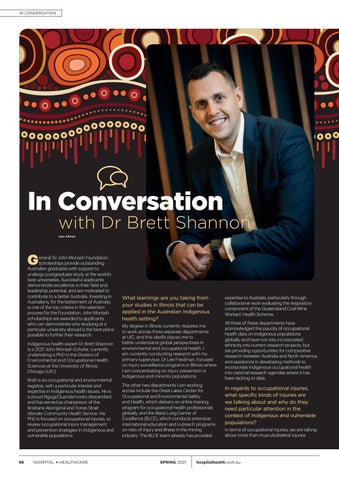IN CONVERSATION
In Conversation
with Dr Brett Shannon Jane Allman
G
eneral Sir John Monash Foundation scholarships provide outstanding Australian graduates with support to undergo postgraduate study at the world’s best universities. Successful applicants demonstrate excellence in their field and leadership potential, and are motivated to contribute to a better Australia. Investing in Australians, for the betterment of Australia, is one of the top criteria in the selection process for the Foundation. John Monash scholarships are awarded to applicants who can demonstrate why studying at a particular university abroad is the best place possible to further their research. Indigenous health expert Dr Brett Shannon is a 2021 John Monash Scholar, currently undertaking a PhD in the Division of Environmental and Occupational Health Sciences at the University of Illinois Chicago (UIC). Brett is an occupational and environmental registrar, with a particular interest and expertise in Indigenous health issues. He is a proud Ngugi/Quandamooka descendant and has served as chairperson of the Brisbane Aboriginal and Torres Strait Islander Community Health Service. His PhD is focused on occupational injuries, to review occupational injury management and prevention strategies in Indigenous and vulnerable populations.
96
HOSPITAL + HEALTHCARE
What learnings are you taking from your studies in Illinois that can be applied in the Australian Indigenous health setting? My degree in Illinois currently requires me to work across three separate departments at UIC, and this ideally places me to better understand global perspectives in environmental and occupational health. I am currently conducting research with my primary supervisor, Dr Lee Friedman, focused on injury surveillance programs in Illinois where I am concentrating on injury prevention in Indigenous and minority populations. The other two departments I am working across include the Great Lakes Center for Occupational and Environmental Safety and Health, which delivers an online training program for occupational health professionals globally, and the Black Lung Center of Excellence (BLCE), which conducts extensive international education and outreach programs on risks of injury and illness in the mining industry. The BLCE team already has provided
SPRING 2021
expertise to Australia, particularly through collaborative work evaluating the respiratory component of the Queensland Coal Mine Workers’ Health Scheme. All three of these departments have acknowledged the paucity of occupational health data on Indigenous populations globally and have not only incorporated ethnicity into current research projects, but are providing opportunities for comparative research between Australia and North America, and assistance in developing methods to incorporate Indigenous occupational health into national research agendas where it has been lacking to date.
In regards to occupational injuries, what specific kinds of injuries are we talking about and why do they need particular attention in the context of Indigenous and vulnerable populations? In terms of occupational injuries, we are talking about more than musculoskeletal injuries
hospitalhealth.com.au
